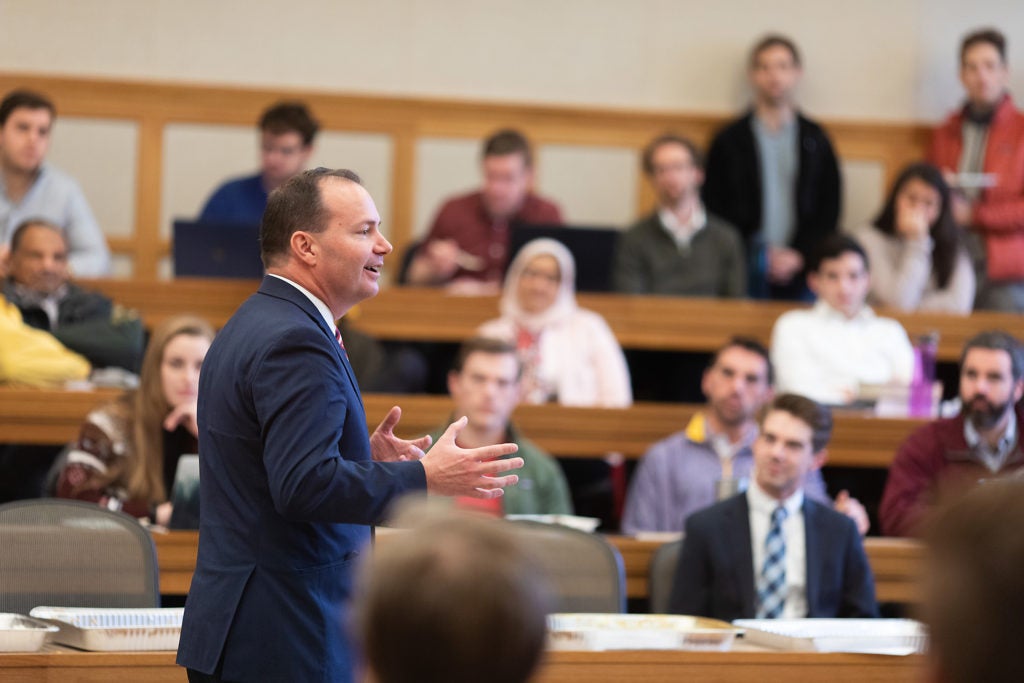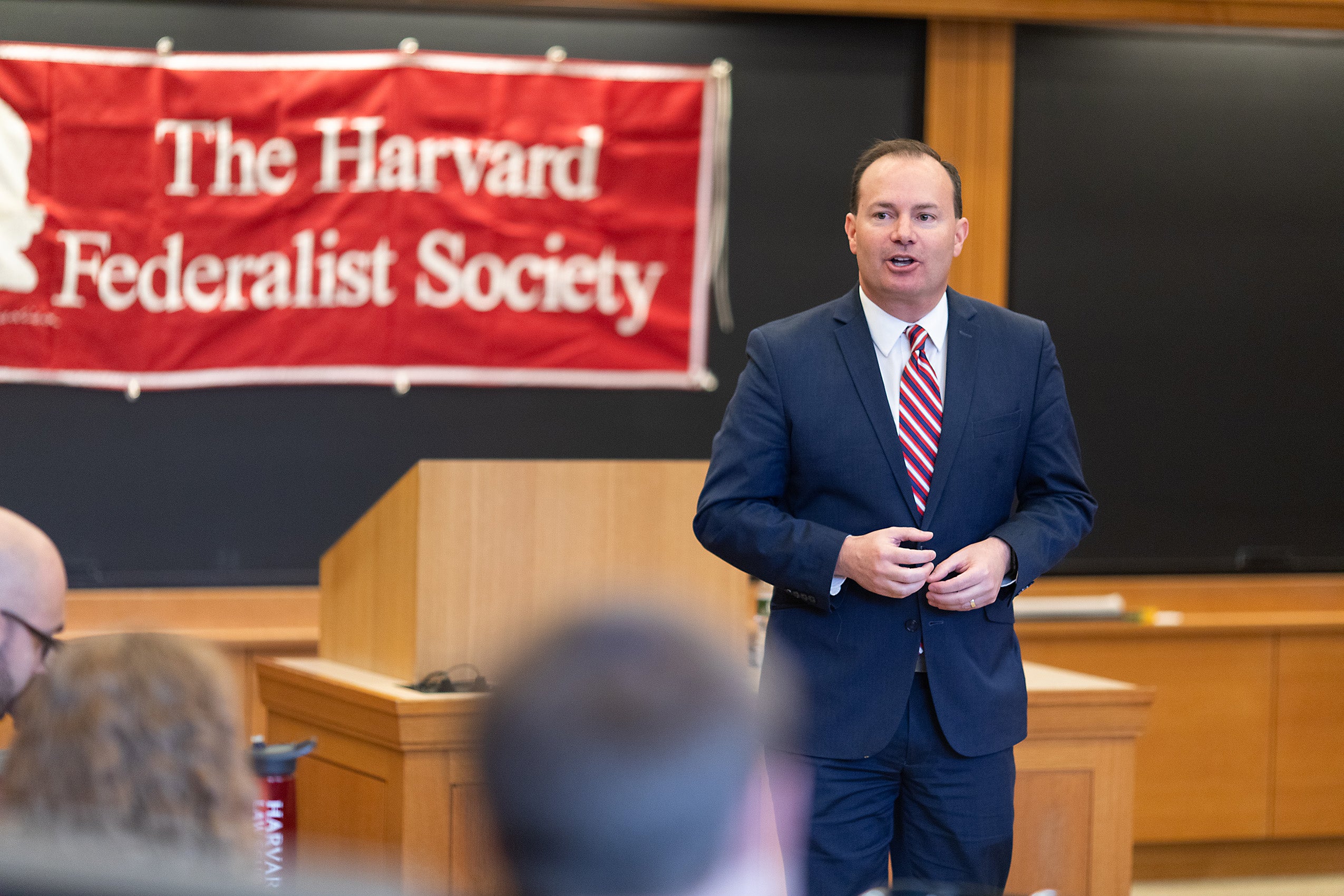It may have surprised Harvard Law School students at a recent lunchtime talk to hear an American politician praise the foundational laws of North Korea.
But according to United States Senator Mike Lee of Utah, the constitutions of repressive dictatorships often contain as many or more civil liberties than the United States. Lee recalled hearing Supreme Court Justice Neil Gorsuch ’91 claiming North Korea had his favorite national bill of rights, “the sort you would hope any country you lived in would have,” he said, quoting Gorsuch. In practice, however, those rights are not easily defended against North Korean dictator Kim Jong-un’s all-encompassing power to make, interpret and execute the laws.
Lee made the comparison and offered his perspective on the current state of constitutional law in America at an event organized by the Harvard Federalist Society.
In contrast to countries such as North Korea or Cuba, said Lee, the United States relies on “two fundamental structural protections” to guarantee Americans’ constitutional rights: federalism and separation of powers. For most of American history, politicians respected those two constitutional doctrines. But that changed during the Great Depression, Lee argued, when first President Herbert Hoover, followed by Franklin Delano Roosevelt, used the Constitution’s commerce clause to dramatically expand the role of the federal government.
“Prior to the New Deal era, local activities, even local economic activities, like labor, manufacturing, agriculture and mining were widely understood to be activities that took place in one state at one time,” the senator said. “They were not part of interstate commerce, even though they were commercial in nature.”
In the Federalist Papers, he noted, James Madison had argued that the authority of the national government would be limited. In his essay, “The Alleged Danger From the Powers of the Union to the State Governments Considered,” the founding father and fourth American president had written: “The powers delegated by the proposed Constitution to the federal government are few and defined. Those which are to remain in the State governments are numerous and indefinite.”
That understanding of federalism changed on April 12, 1937, Lee said, when the Supreme Court upheld the National Labor Relations Act of 1935 in National Labor Relations Board v Jones & Laughlin Steel Corporation and, in doing so, dramatically expanded Congress’ ability to regulate activities that had previously fallen under state purview.
The federal government’s expanded mandate, based on Congress’s constitutional authority to regulate interstate commerce, created a host of new federal laws on topics that had previously been left to the states and, ironically, triggered a key shift in lawmaking authority. When the expanded congressional powers resulted in an increased workload and more accountability for laws affecting more people—some of whom would be unhappy with the results—lawmakers began deferring both the work and the political risk of regulating American lives to unelected staff at a growing number of federal agencies. Thus, Lee said, Congress was transformed into “an all-purpose platitude enacting body.”
While he believed that, “by and large, the people who run these agencies are hard-working, well-intentioned, well-educated, [and] highly-specialized in their fields,” Lee worried that their role in creating law has outstripped that of Congress. To illustrate this discrepancy, the senator said he keeps in his office stacks of all statutes passed by Congress and all regulations created by federal agencies from the last year. The first is measured in inches, while the latter stands at approximately 13 feet.

Efforts since the New Deal to maintain congressional oversight ultimately failed. For instance, Congress began inserting so-called “legislative veto” provisions in many of the laws it passed, enabling the House of Representatives to vote down, by a simple majority, regulations created by the executive branch with which lawmakers disagreed. “This became wildly popular,” Lee said, with Congress ultimately incorporating legislative veto provisions into approximately 450 different federal statutes.
But in 1983, the U.S. Supreme Court found the use of the legislative veto unconstitutional. In its ruling in Immigration and Naturalization Service v. Chadha, the court, led by Warren Burger, held that the process violated the principles of bicameralism and separation of powers, because the vote was taken by only one house of Congress, and the results were not presented to the president for approval or veto.
The result of this train of events, Lee said, was that “tragically, we have moved away from federalism and separation of powers under the leadership of the Houses of Representatives, of Senates, and of White Houses of every conceivable partisan combination.”
According to Lee, such changes have had lasting impacts on American democracy, on the economy, and on people’s pocketbooks. The fact that these legally binding obligations are being put in place by people unaccountable to the voters is, he said, both “wrong” and “anti-democratic.”
More practically, it adds up, the senator said, to a $2 trillion annual invisible tax on the economy, which primarily falls on primarily middle- and lower-income Americans, “who pay for the compliance costs through higher prices on goods and services on everything they buy … and yet they never see a bill for this.”
“This is a product of deviation from federalism and separation of powers,” Lee said. “You can’t unwind one without unwinding the other.”
Senator Lee ended on a hopeful note, concluding that America’s commitment to both these constitutional principles would be reinvigorated in the coming years, and that the Federalist Society would be instrumental in making it happen. “The Federalist Society, I believe, can and must and will play a pivotal role in restoring these things,” he said.
